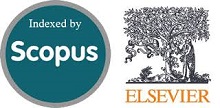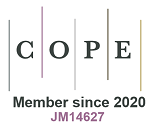Sustainable Bank Performance Antecedents in the Covid-19 Pandemic Era: A Conceptual Model
Abstract
Doi: 10.28991/ESJ-2022-06-04-09
Full Text: PDF
Keywords
References
Pati, U. K. (2020). Indonesian Government Policy in Mitigating Economic Risks due to the Impact of the Covid-19 Outbreak. Journal of Law and Legal Reform, 1(4), 577–590. doi:10.15294/jllr.v1i4.39539.
Kantabutra, S. (2006). Relating vision-based leadership to sustainable business performance: A Thai perspective. Kravis Leadership Institute Leadership Review, 6(1), 37-53.
Birkin, F., Cashman, A., Koh, S. C. L., & Liu, Z. (2009). New sustainable business models in China. Business Strategy and the Environment, 18(1), 64–77. doi:10.1002/bse.568.
Staniškis, J. K., & Arbačiauskas, V. (2009). Sustainability performance indicators for industrial enterprise management. Environmental Research, Engineering and Management, 48(2), 42-50.
Fernando, Y., Chiappetta Jabbour, C. J., & Wah, W.-X. (2019). Pursuing green growth in technology firms through the connections between environmental innovation and sustainable business performance: Does service capability matter? Resources, Conservation and Recycling, 141, 8–20. doi:10.1016/j.resconrec.2018.09.031.
Laužikas, M., & Mokšeckienė, R. (2013). The Role of Creativity in Sustainable Business. Entrepreneurship and Sustainability Issues, 1(1), 10–22. doi:10.9770/jesi.2013.1.1(2).
Spieth, P., Schneider, S., Clauß, T., & Eichenberg, D. (2019). Value drivers of social businesses: A business model perspective. Long Range Planning, 52(3), 427–444. doi:10.1016/j.lrp.2018.04.004.
Vergara, C. C., & Agudo, L. F. (2021). Fintech and sustainability: Do they affect each other? Sustainability (Switzerland), 13(13). doi:10.3390/su13137012.
Subanidja, S., Sorongan, F. A., & Legowo, M. B. (2022). Leveraging Financial Technology Entity into Sustainable Bank Performance through a Competitive Advantage. Emerging Science Journal, 6(1), 53–63. doi:10.28991/ESJ-2022-06-01-04.
Liu, Y., Saleem, S., Shabbir, R., Shabbir, M. S., Irshad, A., & Khan, S. (2021). The relationship between corporate social responsibility and financial performance: a moderate role of fintech technology. Environmental Science and Pollution Research, 28(16), 20174–20187. doi:10.1007/s11356-020-11822-9.
Al-Dmour, H., Asfour, F., Al-Dmour, R., & Al-Dmour, A. (2020). The effect of marketing knowledge management on bank performance through fintech innovations: A survey study of jordanian commercial banks. Interdisciplinary Journal of Information, Knowledge, and Management, 15, 203–225. doi:10.28945/4619.
Legowo, M. B., Subanidja, S., & Sorongan, F. A. (2020). Model of Sustainable Development Based on FinTech in Financial and Banking Industry: A Mixed-Method Research. 2020 3rd International Conference on Computer and Informatics Engineering (IC2IE). doi:10.1109/ic2ie50715.2020.9274605.
Meiling, L., Yahya, F., Waqas, M., Shaohua, Z., Ali, S. A., & Hania, A. (2021). Boosting Sustainability in Healthcare Sector through Fintech: Analyzing the Moderating Role of Financial and ICT Development. Inquiry (United States), 58. doi:10.1177/00469580211028174.
Haseeb, M., Hussain, H. I., Ślusarczyk, B., & Jermsittiparsert, K. (2019). Industry 4.0: A solution towards technology challenges of sustainable business performance. Social Sciences, 8(5). doi:10.3390/socsci8050154.
Kalender, Z. T., & Vayvay, Ö. (2016). The Fifth Pillar of the Balanced Scorecard: Sustainability. Procedia - Social and Behavioral Sciences, 235, 76–83. doi:10.1016/j.sbspro.2016.11.027.
Nicolăescu, E., Alpopi, C., & Zaharia, C. (2015). Measuring corporate sustainability performance. Sustainability (Switzerland), 7(1), 851–865. doi:10.3390/su7010851.
Lo, S. F. (2010). Performance evaluation for sustainable business: A profitability and marketability framework. Corporate Social Responsibility and Environmental Management, 17(6), 311–319. doi:10.1002/csr.214.
Monday, J. U. (2015). Local Content Policy, Human Capital Development and Sustainable Business Performance in the Nigerian Oil and Gas Industry. Journal of Management and Sustainability, 5(1). doi:10.5539/jms.v5n1p75.
Van Kleef, J. A. G., & Roome, N. J. (2007). Developing capabilities and competence for sustainable business management as innovation: a research agenda. Journal of Cleaner Production, 15(1), 38–51. doi:10.1016/j.jclepro.2005.06.002.
Fowler, S. J., & Hope, C. (2007). A critical review of sustainable business indices and their impact. Journal of Business Ethics, 76(3), 243–252. doi:10.1007/s10551-007-9590-2.
Khoo, H. H., & Tan, K. C. (2002). Critical success factors for quality management implementation in Russia. Industrial and Commercial Training, 34(7), 263–268. doi:10.1108/00197850210447255.
Gomber, P., Koch, J. A., & Siering, M. (2017). Digital Finance and FinTech: current research and future research directions. Journal of Business Economics, 87(5), 537–580. doi:10.1007/s11573-017-0852-x.
Davis, K., Maddock, R., & Foo, M. (2017). Catching up with Indonesia’s fintech industry. Law and Financial Markets Review, 11(1), 33–40. doi:10.1080/17521440.2017.1336398.
Kim, Y., Choi, J., Park, Y. J., & Yeon, J. (2016). The adoption of mobile payment services for “fintech.” International Journal of Applied Engineering Research, 11(2), 1058–1061.
Prawirasasra, K. P. (2018). Financial technology in Indonesia: disruptive or collaborative? Reports on Economics and Finance, 4(2), 83–90. doi:10.12988/ref.2018.818.
Razzaque, A., & Hamdan, A. (2020). Role of Financial Technology FinTech: A Survey. Proceedings of the International Conference on Artificial Intelligence and Computer Vision (AICV2020), 112–117. doi:10.1007/978-3-030-44289-7_11.
Varga, D. (2017). Fintech, the new era of financial services. Vezetéstudomány / Budapest Management Review, 48(11), 22–32. doi:10.14267/veztud.2017.11.03.
Subanidja, S., Legowo, M. B., Sorongan, F. A., & Wahyudi, E. (2020). The Choice of Collaborating with Fintech Entities for Competitive Advantage through Leadership Styles. Scientific Papers of the University of Pardubice. Series D, Faculty of Economics & Administration, 28(3). doi:10.46585/SP28031092.
Zavolokina, L., Dolata, M., & Schwabe, G. (2016). FinTech – What’s in a Name? 37th International Conference on Information Systems Proceeding, Dublin, Ireland, 11-14 December 2016, 1–19.
Erosa, V. E. (2018). Online Money Flows: Exploring the Nature of the Relation of Technology’s New Creature to Money Supply—A Suggested Conceptual Framework and Research Propositions. American Journal of Industrial and Business Management, 08(02), 250–305. doi:10.4236/ajibm.2018.82017.
Alt, R., Beck, R., & Smits, M. T. (2018). FinTech and the transformation of the financial industry. Electronic Markets, 28(3), 235–243. doi:10.1007/s12525-018-0310-9.
Haseeb, M., Hussain, H. I., Kot, S., Androniceanu, A., & Jermsittiparsert, K. (2019). Role of social and technological challenges in achieving a sustainable competitive advantage and sustainable business performance. Sustainability (Switzerland), 11(14). doi:10.3390/su11143811.
Ives, B., Jarvenpaa, S. L., & Mason, R. O. (1993). Global business drivers: aligning information technology to global business strategy. IBM Systems Journal, 32(1), 143–161. doi:10.1147/sj.321.0143.
Barua, A., Konana, P., Whinston, A., & Yin, F. (2000). Making e-business pay: eight key drivers for operational success. IT Professional, 2(6), 22–30. doi:10.1109/6294.888013.
Avkiran, N. K. (1997). Models of retail performance for bank branches: Predicting the level of key business drivers. International Journal of Bank Marketing, 15(6), 224–237. doi:10.1108/02652329710184451.
Yeniyurt, S., Wu, F., Kim, D., & Cavusgil, S. T. (2019). Information technology resources, innovativeness, and supply chain capabilities as drivers of business performance: A retrospective and future research directions. Industrial Marketing Management, 79, 46–52. doi:10.1016/j.indmarman.2019.03.008.
Tura, N., Hanski, J., Ahola, T., Ståhle, M., Piiparinen, S., & Valkokari, P. (2019). Unlocking circular business: A framework of barriers and drivers. Journal of Cleaner Production, 212, 90–98. doi:10.1016/j.jclepro.2018.11.202.
Martinez-Martinez, A., Cegarra-Navarro, J. G., Garcia-Perez, A., & Wensley, A. (2019). Knowledge agents as drivers of environmental sustainability and business performance in the hospitality sector. Tourism Management, 70, 381–389. doi:10.1016/j.tourman.2018.08.030.
Pucihar, A., Lenart, G., Borštnar, M. K., Vidmar, D., & Marolt, M. (2019). Drivers and outcomes of business model innovation-micro, small and medium-sized enterprises perspective. Sustainability (Switzerland), 11(2), 344. doi:10.3390/su11020344.
Legowo, M. B., Indiarto, B., & Prayitno, D. (2021). Digitalization for Business Model Innovation: Create, Change, and Improve for Values. 2021 4th International Conference of Computer and Informatics Engineering (IC2IE). doi:10.1109/ic2ie53219.2021.9649340.
Smardon, R. (2020). Margaret O’Gorman. Strategic Corporate Conservation Planning, Island Press, Wash DC, Covelo CA and London 2020. Journal of Environmental Studies and Sciences, 10(4), 496–497. doi:10.1007/s13412-020-00615-8.
Fields, Z., & Atiku, S. O. (2019). Collective Green Creativity and Eco-Innovation as Key Drivers of Sustainable Business Solutions in Organizations. Green Business, 415–439. doi:10.4018/978-1-5225-7915-1.ch022.
Imenda, S. (2014). Is There a Conceptual Difference between Theoretical and Conceptual Frameworks? Journal of Social Sciences, 38(2), 185–195. doi:10.1080/09718923.2014.11893249.
Leshem, S., & Trafford, V. (2007). Overlooking the conceptual framework. Innovations in Education and Teaching International, 44(1), 93–105. doi:10.1080/14703290601081407.
Griffith, R. (2012). Electronic money and monetary policy. Southwestern Economic Proceedings, 31(2), 47-56.
Hansen, G. S., & Wernerfelt, B. (1989). Determinants of firm performance: The relative importance of economic and organizational factors. Strategic Management Journal, 10(5), 399–411. doi:10.1002/smj.4250100502.
Melville, N., Kraemer, K., & Gurbaxani, V. (2004). Review: Information technology and organizational performance: An integrative model of it business value. MIS Quarterly: Management Information Systems, 28(2), 283. doi:10.2307/25148636.
Barney, J. (1991). Firm Resources and Sustained Competitive Advantage. Journal of Management, 17(1), 99–120. doi:10.1177/014920639101700108.
Rogers, E. M. (2010). Diffusion of innovations (4th Ed.). Free Press, New York, United States.
Pease, W., & Rowe, M. (2005). Diffusion of Innovation - The Adoption of Electronic Commerce by Small and Medium Enterprises (SMES)- A Comparative Analysis. Australasian Journal of Information Systems, 13(1). doi:10.3127/ajis.v13i1.78.
Mohd Zawawi, N. F., Abd Wahab, S., Al-Mamun, A., Sofian Yaacob, A., Kumar AL Samy, N., & Ali Fazal, S. (2016). Defining the Concept of Innovation and Firm Innovativeness: A Critical Analysis from Resorce-Based View Perspective. International Journal of Business and Management, 11(6), 87. doi:10.5539/ijbm.v11n6p87.
Fernandes, C. I., Ferreira, J. J. M., & Raposo, M. L. (2013). Drivers to firm innovation and their effects on performance: An international comparison. International Entrepreneurship and Management Journal, 9(4), 557–580. doi:10.1007/s11365-013-0263-6.
Khazanchi, S., Lewis, M. W., & Boyer, K. K. (2007). Innovation-supportive culture: The impact of organizational values on process innovation. Journal of Operations Management, 25(4), 871–884. doi:10.1016/j.jom.2006.08.003.
Radu, L.-D. (2015). Investments in Technological Innovations: A Literature Review of Organization Determinants. European Scientific Journal, ESJ, 11(3).
Saksonova, S., & Kuzmina-Merlino, I. (2017). Fintech as financial innovation - The possibilities and problems of implementation. European Research Studies Journal, 20(3A), 961–973. doi:10.35808/ersj/757.
Barney, J., Wright, M., & Ketchen, D. J. (2001). The resource-based view of the firm: Ten years after 1991. Journal of Management, 27(6), 625–641. doi:10.1177/014920630102700601.
Porter, M. E. (2011). Competitive advantage, creating and sustaining superior performance. Free Press, New York, Unites States.
Oshodin, O., Molla, A., Karanasios, S., & Ong, C. E. (2017). Is Fin tech a disruption or a new eco-system? An exploratory investigation of banks response to fintech in Australia. Proceedings of the 28th Australasian Conference on Information Systems, ACIS 2017, Hobart, Australia.
Lin, C.-Y. (2006). Factors affecting the innovation in logistics information systems for logistics service providers in Taiwan. Journal of Information and Optimization Sciences, 27(3), 629–648. doi:10.1080/02522667.2006.10699715.
Pollari, I. (2016). The rise of Fintech opportunities and challenges. Jassa, (3), 15-21.
Fernandes, T., & Pedroso, R. (2017). The effect of self-checkout quality on customer satisfaction and repatronage in a retail context. Service Business, 11(1), 69–92. doi:10.1007/s11628-016-0302-9.
Gomber, P., Kauffman, R. J., Parker, C., & Weber, B. W. (2018). On the Fintech Revolution: Interpreting the Forces of Innovation, Disruption, and Transformation in Financial Services. Journal of Management Information Systems, 35(1), 220–265. doi:10.1080/07421222.2018.1440766.
Schaltegger, S., Lüdeke-Freund, F., & Hansen, E. G. (2012). Business cases for sustainability: The role of business model innovation for corporate sustainability. International Journal of Innovation and Sustainable Development, 6(2), 95–119. doi:10.1504/IJISD.2012.046944.
Bower, J. L. and Christensen, C. M., Disruptive technologies: catching the wave. (1995). Long Range Planning, 28(2), 155. doi:10.1016/0024-6301(95)91075-1.
Figge, F., Hahn, T., Schaltegger, S., & Wagner, M. (2002). The sustainability balanced scorecard - Linking sustainability management to business strategy. Business Strategy and the Environment, 11(5), 269–284. doi:10.1002/bse.339.
Ralph, P. (2010). Introducing an Empirical Model of Design. 6th Mediterranean Conference on Information Systems (MCIS 2011), Limassol, Cyprus, September 3-5, 2011. Available online: http://eprints.lancs.ac.uk/id/eprint/57465 (accessed on April 2022).
DOI: 10.28991/ESJ-2022-06-04-09
Refbacks
- There are currently no refbacks.
Copyright (c) 2022 Steph Subanidja, Fangky Antoneus Sorongan, Mercurius Broto Legowo







